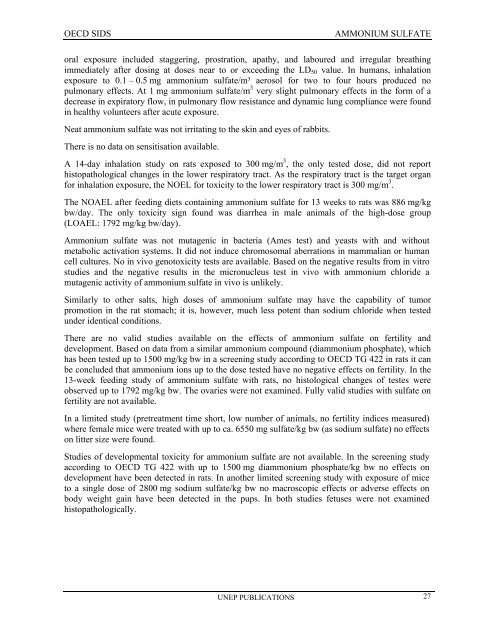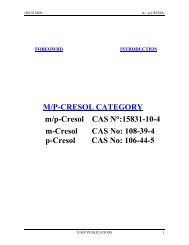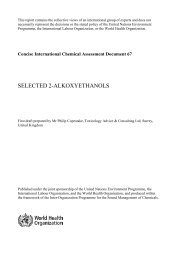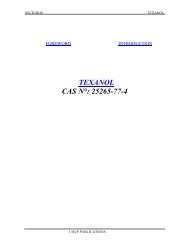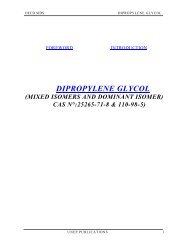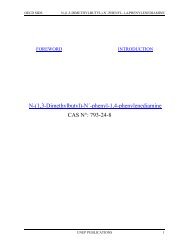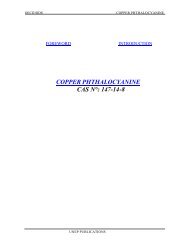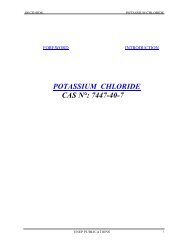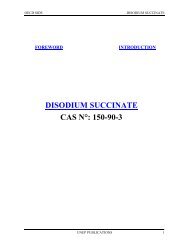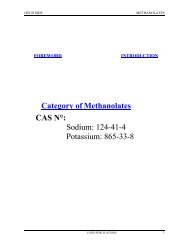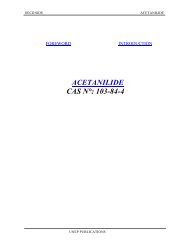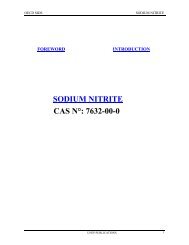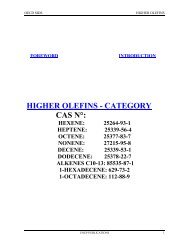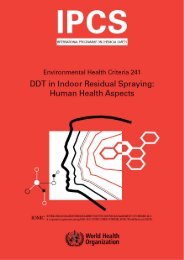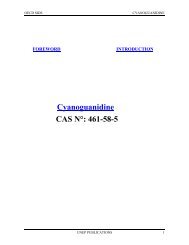AMMONIUM SULFATE CAS N°: 7783-20-2
AMMONIUM SULFATE CAS N°: 7783-20-2
AMMONIUM SULFATE CAS N°: 7783-20-2
Create successful ePaper yourself
Turn your PDF publications into a flip-book with our unique Google optimized e-Paper software.
OECD SIDS<br />
<strong>AMMONIUM</strong> <strong>SULFATE</strong><br />
oral exposure included staggering, prostration, apathy, and laboured and irregular breathing<br />
immediately after dosing at doses near to or exceeding the LD 50 value. In humans, inhalation<br />
exposure to 0.1 – 0.5 mg ammonium sulfate/m³ aerosol for two to four hours produced no<br />
pulmonary effects. At 1 mg ammonium sulfate/m 3 very slight pulmonary effects in the form of a<br />
decrease in expiratory flow, in pulmonary flow resistance and dynamic lung compliance were found<br />
in healthy volunteers after acute exposure.<br />
Neat ammonium sulfate was not irritating to the skin and eyes of rabbits.<br />
There is no data on sensitisation available.<br />
A 14-day inhalation study on rats exposed to 300 mg/m 3 , the only tested dose, did not report<br />
histopathological changes in the lower respiratory tract. As the respiratory tract is the target organ<br />
for inhalation exposure, the NOEL for toxicity to the lower respiratory tract is 300 mg/m 3 .<br />
The NOAEL after feeding diets containing ammonium sulfate for 13 weeks to rats was 886 mg/kg<br />
bw/day. The only toxicity sign found was diarrhea in male animals of the high-dose group<br />
(LOAEL: 1792 mg/kg bw/day).<br />
Ammonium sulfate was not mutagenic in bacteria (Ames test) and yeasts with and without<br />
metabolic activation systems. It did not induce chromosomal aberrations in mammalian or human<br />
cell cultures. No in vivo genotoxicity tests are available. Based on the negative results from in vitro<br />
studies and the negative results in the micronucleus test in vivo with ammonium chloride a<br />
mutagenic activity of ammonium sulfate in vivo is unlikely.<br />
Similarly to other salts, high doses of ammonium sulfate may have the capability of tumor<br />
promotion in the rat stomach; it is, however, much less potent than sodium chloride when tested<br />
under identical conditions.<br />
There are no valid studies available on the effects of ammonium sulfate on fertility and<br />
development. Based on data from a similar ammonium compound (diammonium phosphate), which<br />
has been tested up to 1500 mg/kg bw in a screening study according to OECD TG 422 in rats it can<br />
be concluded that ammonium ions up to the dose tested have no negative effects on fertility. In the<br />
13-week feeding study of ammonium sulfate with rats, no histological changes of testes were<br />
observed up to 1792 mg/kg bw. The ovaries were not examined. Fully valid studies with sulfate on<br />
fertility are not available.<br />
In a limited study (pretreatment time short, low number of animals, no fertility indices measured)<br />
where female mice were treated with up to ca. 6550 mg sulfate/kg bw (as sodium sulfate) no effects<br />
on litter size were found.<br />
Studies of developmental toxicity for ammonium sulfate are not available. In the screening study<br />
according to OECD TG 422 with up to 1500 mg diammonium phosphate/kg bw no effects on<br />
development have been detected in rats. In another limited screening study with exposure of mice<br />
to a single dose of 2800 mg sodium sulfate/kg bw no macroscopic effects or adverse effects on<br />
body weight gain have been detected in the pups. In both studies fetuses were not examined<br />
histopathologically.<br />
UNEP PUBLICATIONS 27


